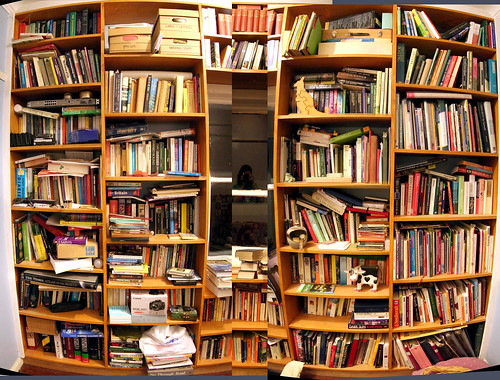
I live in the Windsor, Ontario area, very close to the most southern spot in Canada (Pelee Island located in Lake Erie is the most southern spot). In fact, where I live is actually south of a good portion of the U.S. (try explaining that to our neighbours in the states without pulling out a map). As a result of our geographic location, we seem to miss really large dumps of snow most of the winter. However for some reason, we got hit over the last 36 hours with over 20 cm of snow.
It snowed all day yesterday, without stop. I was in my glory with snow shovel in hand. I shoveled on at least 4 occasions to keep up with the accumulation. Around 5:30 pm, after my dau
 ghter Dana and I shoveled together, we decided to go for a walk - it was one of those days cold enough for snow but not too cold for walking.
ghter Dana and I shoveled together, we decided to go for a walk - it was one of those days cold enough for snow but not too cold for walking.We went for a short walk in the neighbourhood. At this hour of the day, not many people had their walks cleaned - in fact we ended up walking on the road for the most part because the snow was so deep on the sidewalk. And that got me thinking.
But let me digress for a bit (I think this whole post is a digression so far - but give me a minute and I'll get to the point of this post). I'm a runner and have been for a number of years. My running partner and I have been running together for over 15 years on a regular basis year round in all kinds of weather conditions. Winter running is always a challenge for us, not because of the cold but because of the sidewalks. I don't know how many times either I or my partner have slipped and almost fallen or have had to go onto the road (which is really risking your life when we run in the winter evenings) because some people don't clean their sidewalks after a snow storm. And some people never do clean them - 2 days later, a week later and the same homes still have an unpassable mess on their sidewalk. So my experiences as an outside winter runner and my walk yesterday got me thinking about civic literacy.
What does it mean to be literate as a member of a community? Well, certainly it includes knowing that if you have a sidewalk in front of your house (or if you are lucky enough to be on a corner with a sidewalk at the front and side of your house), cleaning it after a snow dump. It means other things such as knowing to clean up after your dog (another issue - why do people let their dog do business on the sidewalk and then leave it there for kids walking to and from school to step in?), and respect for your neighbour's property by not throwing garbage on their yard (we have a corner lot and often get empty beer bottles or fast food containers dumped on our yard on Saturday nights in the summer).
But maybe this isn't civic literacy but character education and the trait of empathy - being able to put yourself in the shoes of others. I think that the social upheavals of the 60's and 70's, and the me-generations of the 80's and 90's changed a lot of things - certainly for the better in issues such as women's rights, ethnic and racial rights, and awareness of the environment. However, I think that a lot of things deteriorated - manners, thinking about what's right for the whole not just what's right for the individual, respect, individual accountability. And I think that this lack of empathy, manners and individual accountability explains why we have issues with cyberbullying (and people not cleaning their sidewalks).
As educators, we are now charged with teaching character (something we've always done but now it's officially mandated by the Ministry, like it's something new). So, I'm hoping that in the next decade when our current students become old enough to be homeowners (hopefully by that time the financial messes will be cleaned up), I won't have to worry about uncleaned sidewalks on my runs (or maybe walks by that time).
Images: views from my garage, taken by me on January 11, 2009






2 comments:
Hi Sharon,
Interesting that a new frontier for education is teaching 'character.' I always believed that good teachers are socialisers of a child's education. We are indirectly, and now directly, teaching them what it means to be good citizens interacting with each other constructively in society.
Indirectly, directly,good teachers have always tried to teach students to be good citizens. Reinforcement of good citizenship has to come from the rest of the village - parents, neighbours and society.
Post a Comment